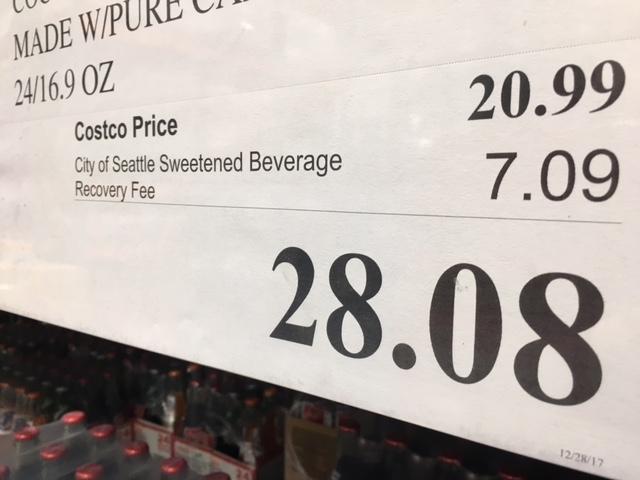The reasons covered in other answers are good, but I don't think they really get to the heart of what makes soda taxes so hard to implement in the U.S.
Soda taxes, in particular, are highly visible, blatantly hypocritical and (at least as implemented in the US), easily avoidable. Most other taxes and assorted acts of regulation don't share those traits, which is why I think you see more opposition and push-back against soda taxes than, say, sales taxes or income taxes.
Visibility
Because of the way they've been implemented, consumers have noticed or been forewarned of the direct cost to them. For example:

That's a hard thing to spin. "This thing is now a third more expensive, because of this specific tax. Don't blame us, go tar and feather the Seattle City Council, please."
The fact that it kicks in and gets noticed every time someone orders a soda with their Big Mac is also an aggravating factor. Not only is there a visible, significant cost, it has a high rate of occurrence for those impacted by it.
Hypocrisy
One can certainly make the argument that there's no shortage of hypocrisy and blatant lying in government policy to begin with, but it seems especially thick in soda taxes.
As you noted in your question, sugar is unhealthy, at least at the levels in American diets. That being said, using this as a justification for levying a new tax is blatantly hypocritical. That's probably the oldest lie in the book, and enough people have noticed and are pushing back on that particular lie at this point. Like alcohol and tobacco taxes and speeding tickets, and every other government fee levied against "unhealthy" or "undesirable" behavior, the money raised doesn't actually go to paying for the costs of the targeted behavior. It goes to the general fund, and gets spent on everything from public-funded art to government administrative costs. Philadelphia, for example, plans to use the revenues from its soda tax to fund public schools, so... saying "because it's unhealthy" out of one side of your mouth and "funding public schools" out of the other is just a long-winded way of admitting that you're lying about your reasons.
The other problem, which applies to all government revenue, but is especially off-putting when heath or safety is used as a justification is that once they have the revenue, the government in question tends to get addicted to it.
Here's a fun older NYT article about that regarding government tobacco revenues, and there's been even more drama than usual around tobacco taxes recently - with smoking rates dropping, governments are having a hard time making up the revenue, and occasionally admitting it's because of less revenue from tobacco taxes. (Which obviously hurts the already incredulous public health justification for these taxes.) So, on the one hand, government is taxing it to reduce this unhealthy behavior, but on the other hand, now that the behavior's reduced, we need more taxes to bring in enough money.
And compounding that problem is that taxing one particular unhealthy behavior doesn't necessarily lead to healthier behavior. For example, since Philadelphia instituted its soda tax, soda sales are down, but liquor sales up. Probably not what most public health policy professionals would consider an improvement.
Soda taxes, in particular, are also highly regressive - soda consumption is highest among those with lower income rates, which undermines notions of fairness, as well as the public health argument. (In that the lower income people are the ones government-funded healthcare is intended for, and the system is set up in a way so that it's not the poor who are supposed to be paying for their own government-funded healthcare).
And last, but definitely not least, most (maybe even all) of these soda taxes apply to carbonated and/or sweetened beverages. So blaming sugar for being unhealthy, while taxing diet beverages that contain no sugar is such blatant, obvious BS, that I can't believe any politicians thought they'd get away with it in the first place. (And of course, the tax would fail at its actual goal of raising revenue if it was only targeted at regular drinks, because too many people would just switch to diet, so that's not an option.)
Avoidability
Unlike most other taxes we face in our day-to-day life, this is a very avoidable type of tax. It's all cities and counties implementing the tax, not states or federal government, so it's easy to avoid the tax by driving a little bit. This both irritates people, leading to more vocal opposition and undercuts revenue from the tax, because people can often literally cross the street to avoid it:
"It's a bad tax," Melvin Robinson, owner of Bruno's Pizza, tells Stossel. His store is on the outer edge of Philadelphia, so his customers just cross the street to avoid paying the tax.
That's not really an option with other taxes - you can't easily move to avoid income tax, and sales taxes tend to be fairly similar within a given geographical area, but soda taxes are rare and create an easy situation for avoidance. (And smuggling. Yup, soda smuggling.)
Not that any of this is meant to detract from the other reasons given in other answers, such as louder minority opposition or taxation/regulation overload, because those are valid points, but I think those are problems that apply more generally, whereas soda taxes have these specific issues that cause them to fail where so many countless forests of new regulations and taxes succeed.
